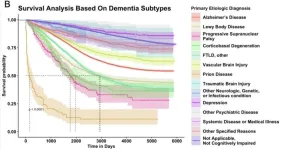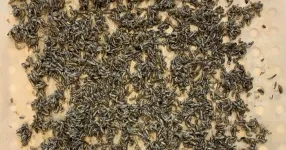(Press-News.org) Research Highlights:
An analysis of survey data for 430,000 adults in the U.S. found that using cannabis has a significant association with an increased risk of heart attack and stroke, independent of tobacco use, with higher odds among the adults with more frequent use (more days of use per month). The most common method of cannabis use was smoking, followed by eating or vaporizing it.
The increase in the combined risk of coronary heart disease, heart attack and stroke was similar to the risk among the subset of adults who had never used e-cigarettes but did use cannabis.
Embargoed until 4 a.m. CT/5 a.m. ET Wednesday, February 28, 2024
DALLAS, Feb. 28, 2024 — An analysis of 430,000 adults in the U.S. found that using cannabis, most commonly through smoking, eating or vaporizing it, was significantly associated with a higher risk of heart attack and stroke, even after controlling for tobacco use (combustible cigarettes and other tobacco products) and other cardiovascular risk factors, according to new research published today in the Journal of the American Heart Association, an open access, peer-reviewed journal of the American Heart Association.
Although cannabis, or marijuana, is illegal at the federal level, 24 states and Washington, D.C., have legalized the use of recreational cannabis. Additionally, the number of people in the U.S. who use cannabis has increased significantly in recent decades, according to the 2019 National Survey on Drug Use and Health from the Substance Abuse and Mental Health Services Administration of the U.S. Department of Health and Human Services. The annual survey found that in 2019, 48.2 million people ages 12 or older reported using cannabis at least once, compared to 25.8 million people ages 12 or older in 2002, an increase to 17% from 11%.
“Despite common use, little is known about the risks of cannabis use and, in particular, the cardiovascular disease risks,” said lead study author Abra Jeffers, Ph.D., a data analyst at Massachusetts General Hospital in Boston. “The perceptions of the harmfulness of smoking cannabis are decreasing, and people have not considered cannabis use dangerous to their health. However, previous research suggested that cannabis could be associated with cardiovascular disease. In addition, smoking cannabis—the predominant method of use—may pose additional risks because particulate matter is inhaled.”
In this study, researchers reviewed survey data collected for 430,000 adults from 2016 through 2020 to examine the association between cannabis use and adverse cardiovascular outcomes including heart disease, heart attack and stroke. The survey data was collected through the Behavioral Risk Factor Surveillance System, a national, cross-sectional survey performed annually by the U.S. Centers for Disease Control and Prevention.
The researchers specifically investigated whether cannabis use was associated with adverse cardiovascular outcomes among the general adult population, among people who had never smoked tobacco or used e-cigarettes, and among younger adults (defined as men under age 55 and women under age 65) at risk for heart disease. They also factored in the number of days per month that people used cannabis.
The analyses of found:
Any cannabis use (smoked, eaten or vaporized) was independently associated with a higher number of adverse cardiovascular outcomes (coronary heart disease, myocardial infarction and stroke) and with more frequent use (more days per month), the odds of adverse outcomes were even higher. The results were similar after controlling for other cardiovascular risk factors, including tobacco and/or e-cigarette use, alcohol consumption, body mass index, Type 2 diabetes and physical activity.
Both daily and non-daily cannabis users had an increased risk of heart attack compared to non-users; daily cannabis users had 25% higher odds of heart attack compared to non-users.
The odds of stroke for daily cannabis users were 42% higher compared to non-users, with lower risk among those who used cannabis less than daily.
Among younger adults at risk for premature cardiovascular disease (defined as men younger than 55 years old and women younger than 65 years old) cannabis use was significantly associated with 36% higher combined odds of coronary heart disease, heart attack and stroke, regardless of whether or not they also used traditional tobacco products. A separate analysis of a smaller subgroup of these adults who had never smoked tobacco cigarettes or used nicotine e-cigarettes also found a significant association between cannabis use and an increase in the combined odds of coronary heart disease, heart attack and stroke.
“Our sample was large enough that we could investigate the association of cannabis use with cardiovascular outcomes among adults who had never used tobacco cigarettes or e-cigarettes,” Jeffers said. “Cannabis smoke is not all that different from tobacco smoke, except for the psychoactive drug: THC vs. nicotine. Our study shows that smoking cannabis has significant cardiovascular risk risks, just like smoking tobacco. This is particularly important because cannabis use is increasing, and conventional tobacco use is decreasing.”
Study background and details:
Survey participants were ages 18-74, with an average age of 45 years.
About half of the participants self-identified as female. 60.2% self-identified as white adults, 11.6 self-identified as Black adults, 19.3 self-identified as Hispanic adults and 8.9% self-identified as other.
Nearly 90% of adults did not use cannabis at all; 7% used it less than daily; and 4% were daily users. Among current cannabis users, 73.8% reported smoking as the most common form of cannabis consumption. More than 60% of total respondents had never used tobacco cigarettes; 28.6% of daily cannabis users had never used tobacco cigarettes; 44.6% of non-daily cannabis users had never used tobacco cigarettes and 63.9% of participants who did not use cannabis had never used tobacco cigarettes.
The study had several limitations, including that cardiovascular conditions and cannabis use were self-reported, making them potentially subject to recall bias (potential errors in memory); that the authors did not have health data measuring participants’ baseline lipid profile or blood pressure; and the study captured data for only a single point in time for the participants. The authors note that there is a need for prospective cohort studies – studies that follow groups of individuals over time – to examine the association of cannabis use and cardiovascular outcomes while accounting for frequency of cannabis use.
“The findings of this study have very important implications for population health and should be a call to action for all practitioners, as this study adds to the growing literature that cannabis use and cardiovascular disease may be a potentially hazardous combination,” said Robert L. Page II, Pharm.D., M.S.P.H., FAHA, chair of the volunteer writing group for the 2020 American Heart Association Scientific Statement: Medical Marijuana, Recreational Cannabis, and Cardiovascular Health. Page is professor of clinical pharmacy, medicine and physical medicine at the Skaggs School of Pharmacy and Pharmaceutical Sciences at the University of Colorado School of Medicine in Aurora, Colorado. Page was not involved in this study.
“In the overall population, the study findings are consistent with other studies indicating that daily cannabis use was associated with an increase in heart attack, stroke and the combined endpoint of coronary heart disease, heart attack and stroke,” he said. “As cannabis use continues to grow in legality and access across the U.S., practitioners and clinicians need to remember to assess cannabis use at each patient encounter in order to have a non-judgmental, shared decision conversation about potential cardiovascular risks and ways to reduce those risks.”
Co-authors, disclosures and funding sources are listed in the manuscript.
Studies published in the American Heart Association’s scientific journals are peer-reviewed. The statements and conclusions in each manuscript are solely those of the study authors and do not necessarily reflect the Association’s policy or position. The Association makes no representation or guarantee as to their accuracy or reliability. The Association receives funding primarily from individuals; foundations and corporations (including pharmaceutical, device manufacturers and other companies) also make donations and fund specific Association programs and events. The Association has strict policies to prevent these relationships from influencing the science content. Revenues from pharmaceutical and biotech companies, device manufacturers and health insurance providers and the Association’s overall financial information are available here.
Additional Resources:
Multimedia is available on the right column of release link https://newsroom.heart.org/news/cannabis-use-linked-to-increase-in-heart-attack-and-stroke-risk?preview=e919e005254fa47b47399df04824aaf0
After February 28, view the manuscript online.
AHA news release: Marijuana use linked with increased risk of heart attack, heart failure (November 2023)
AHA news release: The 411 on marijuana use and cardiovascular health ahead of 4/20 Day (April 2023)
Follow AHA/ASA news on X (formerly known as Twitter) @HeartNews
Follow news from the Journal of the American Heart Association @JAHA_AHA
###
About the American Heart Association
The American Heart Association is a relentless force for a world of longer, healthier lives. We are dedicated to ensuring equitable health in all communities. Through collaboration with numerous organizations, and powered by millions of volunteers, we fund innovative research, advocate for the public’s health and share lifesaving resources. The Dallas-based organization has been a leading source of health information for a century. During 2024 - our Centennial year - we celebrate our rich 100-year history and accomplishments. As we forge ahead into our second century of bold discovery and impact, our vision is to advance health and hope for everyone, everywhere. Connect with us on heart.org, Facebook, X or by calling 1-800-AHA-USA1.
END
Cannabis use linked to increase in heart attack and stroke risk
More frequent use of cannabis was associated with higher odds of adverse cardiovascular outcomes, finds new study in Journal of the American Heart Association
2024-02-28
ELSE PRESS RELEASES FROM THIS DATE:
Researchers model blood-brain barrier using “Tissue-in-a-CUBE" system
2024-02-28
A research team at the RIKEN Center for Biosystems Dynamics Research (BDR) in Japan has succeeded in establishing a model of the blood-brain barrier using modularized tissue derived from human cells. The “Tissue-in-a-CUBE” is a small cubic structure that could provide a boost in the drug discovery field and be used as an alternative to animal models in pre-clinical studies. The study was published in Communications Biology on February 28.
The blood-brain barrier is a strict gatekeeper around the brain that prevents foreign substances in blood from entering the brain. Although protective, the barrier poses challenges when treatments ...
Study identifies blood biomarkers to predict risk of cardiovascular disease in patients with rheumatoid arthritis
2024-02-28
KEY TAKEAWAYS
Rheumatoid arthritis is associated with increased risk of cardiovascular disease, but it can be challenging to predict which individuals are at highest risk.
Mass General Brigham experts in rheumatology and cardiovascular disease worked together to identify six biomarkers found in blood samples that can predict future risk of arterial inflammation among patients with rheumatoid arthritis.
The team is now working to test these biomarkers in a larger and more long-term cohort of patients with rheumatoid ...
Ai finds key signs that predict patient survival across dementia types
2024-02-28
New York, NY [February 28, 2024]—Researchers at the Icahn School of Medicine at Mount Sinai and others have harnessed the power of machine learning to identify key predictors of mortality in dementia patients.
The study, published in the February 28 online issue of Communications Medicine [10.1038/s43856-024-00437-7], addresses critical challenges in dementia care by pinpointing patients at high risk of near-term death and uncovers the factors that drive this risk. Unlike previous studies that focused on diagnosing dementia, this research delves into predicting patient prognosis, shedding light on mortality ...
Light stimulates a new twist for synthetic chemistry
2024-02-28
Molecules that are induced by light to rotate bulky groups around central bonds could be developed into photo-activated bioactive systems, molecular switches, and more.
Researchers at Hokkaido University, led by Assistant Professor Akira Katsuyama and Professor Satoshi Ichikawa at the Faculty of Pharmaceutical Sciences, have extended the toolkit of synthetic chemistry by making a new category of molecules that can be induced to undergo an internal rotation on interaction with light. Similar processes are believed to be important in some natural biological systems. Synthetic versions might ...
More than just neurons: A new model for studying human brain inflammation
2024-02-28
LA JOLLA (February 28, 2024)—The brain is typically depicted as a complex web of neurons sending and receiving messages. But neurons only make up half of the human brain. The other half—roughly 85 billion cells—are non-neuronal cells called glia. The most common type of glial cells are astrocytes, which are important for supporting neuronal health and activity. Despite this, most existing laboratory models of the human brain fail to include astrocytes at sufficient levels or at all, which limits the models’ utility for studying ...
Urgent need to develop best practices to advance use of AI in cardiovascular care
2024-02-28
Statement Highlights:
The American Heart Association encourages research and development of artificial intelligence (AI) and other related tools and services that may support and enable more precise approaches to cardiovascular and stroke research, prevention and care.
Academia, industry and governments worldwide are pouring resources into developing AI-based tools to transform how and when health care is delivered.
While promising research is beginning to emerge in many areas of cardiovascular medicine, AI-based tools, algorithms and systems of care have not yet been proven to improve care enough to justify widespread use.
AI and machine learning digital tools currently exist that ...
Smoking cannabis associated with increased risk of heart attack, stroke
2024-02-28
Smoking cannabis associated with increased risk of heart attack, stroke
NIH-funded observational study shows risk grows sharply with more frequent use
Frequent cannabis smoking may significantly increase a person’s risk for heart attack and stroke, according to an observational study supported by the National Institutes of Health. The study, published in the Journal of the American Heart Association, uses data from nearly 435,000 American adults, and is among the largest ever to explore the relationship ...
NYUAD researchers highlight a potential flaw in operating room ventilation that increases risk of infection by COVID-19
2024-02-28
● Simple modifications to ventilation systems improve airflow, making operations safer for both patients and surgical teams
● This research was conducted in close collaboration with a team of surgeons from Cleveland Clinic Abu Dhabi (CCAD)
Abu Dhabi, UAE, February 28, 2024: NYU Abu Dhabi (NYUAD) engineers studying ventilation systems in surgical operating theaters have found that traditional ventilation systems may inadvertently facilitate the circulation of aerosolized pathogen-carrying particles. This, as a result, puts surgical teams at a higher risk of infection by COVID-19 and other airborne diseases.
Using basic engineering tools, including ...
Climate change shrinking fish
2024-02-28
Fish weight in the western North Pacific Ocean dipped in the 2010s due to warmer water limiting food supplies, according to a new study at the University of Tokyo. Researchers analyzed the individual weight and overall biomass of 13 species of fish. In the 1980s and 2010s, the fish were lighter. They attributed the first period of weight loss to greater numbers of Japanese sardine, which increased competition with other species for food. During the 2010s, while the number of Japanese sardine and chub mackerel moderately increased, the effect of climate change warming the ocean appears to have resulted ...
Yeast and kelp flies can replace fishmeal in feed
2024-02-28
Kelp flies and marine yeast cultivated on by-products from the seafood industry can be used in feed for farmed salmon. Replacing fishmeal and soybeans can create more sustainable and circular food production, according to a thesis from the University of Gothenburg.
Food from aquaculture, such as farmed fish, is the food industry’s fastest growing sector. One key reason is that this is a nutritious and protein-rich food that is generally more sustainably produced than protein from land animals.
However, fish farming also has challenges. One is obtaining sufficient amounts of sustainable high-quality feed. Currently, fish feed accounts for about ...
LAST 30 PRESS RELEASES:
Nanoplastics can interact with Salmonella to affect food safety, study shows
Eric Moore, M.D., elected to Mayo Clinic Board of Trustees
NYU named “research powerhouse” in new analysis
New polymer materials may offer breakthrough solution for hard-to-remove PFAS in water
Biochar can either curb or boost greenhouse gas emissions depending on soil conditions, new study finds
Nanobiochar emerges as a next generation solution for cleaner water, healthier soils, and resilient ecosystems
Study finds more parents saying ‘No’ to vitamin K, putting babies’ brains at risk
Scientists develop new gut health measure that tracks disease
Rice gene discovery could cut fertiliser use while protecting yields
Jumping ‘DNA parasites’ linked to early stages of tumour formation
Ultra-sensitive CAR T cells provide potential strategy to treat solid tumors
Early Neanderthal-Human interbreeding was strongly sex biased
North American bird declines are widespread and accelerating in agricultural hotspots
Researchers recommend strategies for improved genetic privacy legislation
How birds achieve sweet success
More sensitive cell therapy may be a HIT against solid cancers
Scientists map how aging reshapes cells across the entire mammalian body
Hotspots of accelerated bird decline linked to agricultural activity
How ancient attraction shaped the human genome
NJIT faculty named Senior Members of the National Academy of Inventors
App aids substance use recovery in vulnerable populations
College students nationwide received lifesaving education on sudden cardiac death
Oak Ridge National Laboratory launches the Next-Generation Data Centers Institute
Improved short-term sea level change predictions with better AI training
UAlbany researchers develop new laser technique to test mRNA-based therapeutics
New water-treatment system removes nitrogen, phosphorus from farm tile drainage
Major Canadian study finds strong link between cannabis, anxiety and depression
New discovery of younger Ediacaran biota
Lymphovenous bypass: Potential surgical treatment for Alzheimer's disease?
When safety starts with a text message
[Press-News.org] Cannabis use linked to increase in heart attack and stroke riskMore frequent use of cannabis was associated with higher odds of adverse cardiovascular outcomes, finds new study in Journal of the American Heart Association





